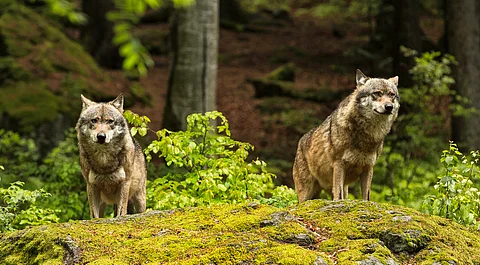

The grey wolf was hunted to extinction on the island of Britain in the last 500 years. Now, a new study says that the UK’s climate targets could be contributed to if the species is brought back to the Scottish Highlands, one of the last remaining wildernesses in Britain.
The last Scottish wolf was killed in 1680. South of the border, the wolf died out in England during the reign of Henry Tudor or Henry VII (1485-1509). Across the Irish Sea, the last wolf in Ireland died in 1786.
A team of researchers D V Spracklen, P J Chapman, T Fletcher, J V Lane, E B Nilsen, M Perks, L Schofield and C E Scott used a model of wolf-red deer dynamics to estimate a wolf reintroduction to four areas of the Scottish Highlands covering 12,167 square kilometres would lead to a total wolf population of 167 ± 23 individuals.
The researchers recognise that their study had simplifications. They assumed that wolves could not leave the reintroduction area. They did not account for alterations in behaviour of prey, changes in nutrient cycling or human-wolf conflicts.
The simulation showed that the reintroduced wolves could reduce red deer populations to less than 4 km−2 within 20 to 23 years after reintroduction.
This figure was the threshold at which the researchers assumed browsing to be sufficiently suppressed to enable natural colonisation of trees.
The team next used a model of native woodland potential to estimate the sequestration of carbon that would be done by subsequent expansion of native woodlands.
“Using a model of potential new native woodlands we estimate the subsequent expansion of native woodland would result in an average annual carbon sequestration of 1.0 ± 0.1 Mt CO2, with each wolf contributing an annual carbon sequestration of 6080 t CO2,” the researchers wrote in their paper.
This would be sufficient to make an important contribution to national climate targets, they said.
“This substantial carbon sequestration and the potential financial benefit related to wolf reintroduction may influence landowner and land manager perspectives around large carnivores,” the team added.
The scientists added the rider that comprehensive stakeholder engagement would be needed well in advance of any proposed reintroduction to identify potentially affected groups and address challenges of co-existing with large carnivores.
“Our work provides further evidence of the role of large carnivores in assisting ecosystem recovery and delivering the nature-based solutions required to address the climate emergency,” they concluded.
Wolf reintroduction to Scotland could support substantial native woodland expansion and associated carbon sequestration has been published in the journal AER Ecological Solutions and Evidence.